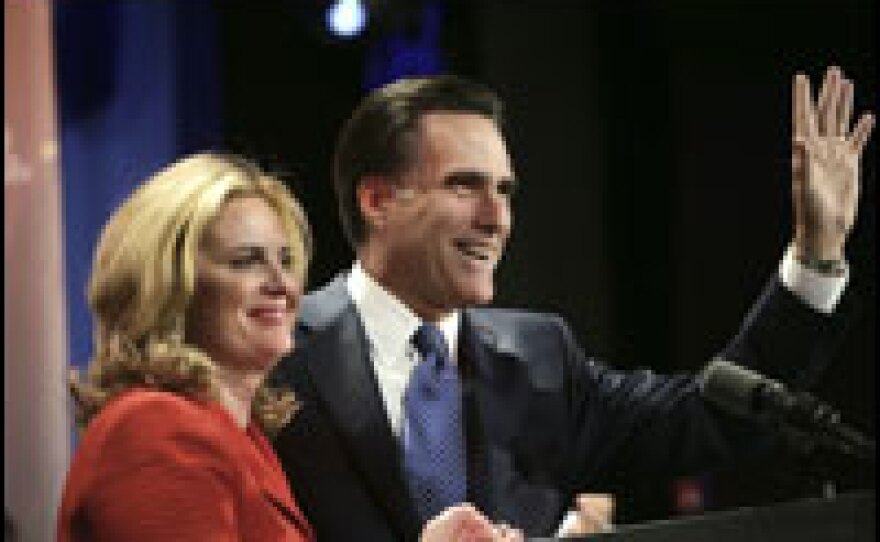
Former Arkansas Gov. Mike Huckabee has won the GOP Iowa caucuses, while Illinois Sen. Barack Obama won on the Democratic side. Both victories represent the triumph of insurgent candidates over their more established rivals.
Huckabee, an ordained Baptist preacher, rode a wave of support from evangelical Christians to victory Thursday night, while Obama's message of change resonated with many Democrats.
It's a remarkable win for Huckabee, who was little more than an asterisk in the race for the Republican nomination just a few months ago. The question is whether he can prevail outside friendly Iowa territory, and go the distance to the nomination.
Obama, meanwhile, broke out of a neck-and-neck contest with his main Democratic rivals, former North Carolina Sen. John Edwards and New York Sen. Hillary Clinton.
Yet Obama, who campaigned as an apostle of change in Washington, was gaining 38 percent support among Democrats. Edwards, who ran promising to battle the special interests in the capital, drew about 30 percent, while Clinton, who stressed her experience, came in at about 29 percent.
Obama, speaking to his supporters, called his victory in Iowa a "defining moment in history."
"Our time for change has come," he said to thunderous applause. "We are choosing hope over fear; we are choosing unity over division and sending a powerful message that change is coming to America."
Both Obama and Huckabee can expect a windfall in terms of media attention and campaign donations, thanks to their victories in Iowa.
The Faith Factor
For many Republican caucus participants, faith was a determining factor. More than eight in 10 Huckabee supporters said they are born-again or evangelical Christians, compared with less than half of those who supported his rival Mitt Romney, the former Massachusetts governor. Nearly two-thirds of Huckabee backers also said it was very important that their candidate share their religious beliefs, compared with about one in five of Romney's.
"I never thought I could love a state more than my home state of Arkansas, but tonight I love Iowa a whole lot," Huckabee told a crowd of cheering supporters.
If the mood was one of elation at Huckabee's headquarters, things were certainly more somber at the headquarters for Romney, who spent a great deal of time and a huge amount of money in Iowa — including about $17 million of his own money.
Romney, who finished second in Iowa, now turns his attention to New Hampshire, which holds its primary on Jan. 8. There, his campaign will be appealing to much more fiscally conservative voters, rather than the social conservatives who dominated the GOP Iowa caucuses. Evangelical conservatives are thought to account for at least one-third — and perhaps as much as 40 percent — of all Republican caucus-goers in Iowa.
Strong Turnout Among Democrats
Preliminary results from an Associated Press survey of Iowa voters shed some light on the Obama victory. About half of Democrats said their candidate's ability to bring about needed change was the most important factor in making their decision, and change was Obama's calling card during the campaign. About one-fifth of Democrats said experience — Clinton's mantra — was most important.
On the Democratic side, a record 236,000 people participated in the caucuses, with many first-time caucus-goers and independents showing up. In 2004, 124,000 Democrats attended the caucuses. Attendance was lower among Republicans, with roughly 116,000 caucus participants.
Edwards came in second, earning 30 percent to Obama's 38 percent, similar to his performance in the 2004 Iowa caucuses. Then, he won 32 percent of the vote, second to Sen. John Kerry's 38 percent. Edwards has been campaigning in Iowa heavily since his vice presidential campaign ended four years ago.
Speaking after the polls closed, Edwards continued to hammer out his populist message, "The one thing that is clear is that the status quo lost, and change won," he said before repeating a familiar refrain — deriding corporate greed in America.
Speaking to her supporters, Clinton put on a brave face on what was clearly a disappointing finish. "I am so ready for the rest of this campaign," Clinton said to thunderous chants of "Hillary, Hillary, Hillary." She repeated a vow that, if elected, she would end the war in Iraq.
Biden, Dodd Drop Out
The Iowa caucuses typically involve a small number of caucus-goers — in 2000, the last time both parties held caucuses, about 145,000 people turned out. This year, more than 220,000 Democrats and 116,000 Republicans participated.
The Iowa contests are considered a crucial step on the road to the White House and are all about momentum.
The results in Iowa, along with those in the New Hampshire primary five days later, will help winnow down the number of candidates. Already, Connecticut Sen. Chris Dodd and Delaware Sen. Joe Biden are abandoning their campaigns for the Democratic presidential nomination after poor showings in the Iowa caucuses.
Defeat in Iowa or New Hampshire, though, does not necessarily spell the end of a candidacy. In 1988, for example, Democrat Michael Dukakis lost in Iowa, and in 2000, George W. Bush failed to win New Hampshire's Republican primary.
Looking Beyond Iowa
"Don't count Clinton and Edwards out yet," said Iowa Sen. Tom Harkin. "I still think you're looking at a three-way race."
Both Clinton and Romney have the financial resources to weather the many primaries that lie ahead. Obama, too, has deep pockets, thanks to tens of millions of dollars in campaign contributions. Edwards, however, has much shallower pockets, and he is relying on matching public funds to finance his campaign.
Not all contenders were focused on Iowa.
Republican Rudolph Giuliani, who did not contest in Iowa but who has been leading nationally, was in Florida on Thursday, making a bid for that state's nomination when it holds its primary Jan. 29. The former New York City mayor is still considered a contender in future primaries.
Meanwhile, Republican Arizona Sen. John McCain has focused much of his efforts on New Hampshire, which he won in 2000, defeating then-Gov. George W. Bush by 16 points. In a sense, Huckabee's Iowa triumph is a boon for McCain because it weakens Romney, McCain's main rival in the Granite State.
Copyright 2022 NPR. To see more, visit https://www.npr.org. 9(MDAzMjM2NDYzMDEyMzc1Njk5NjAxNzY3OQ001))







